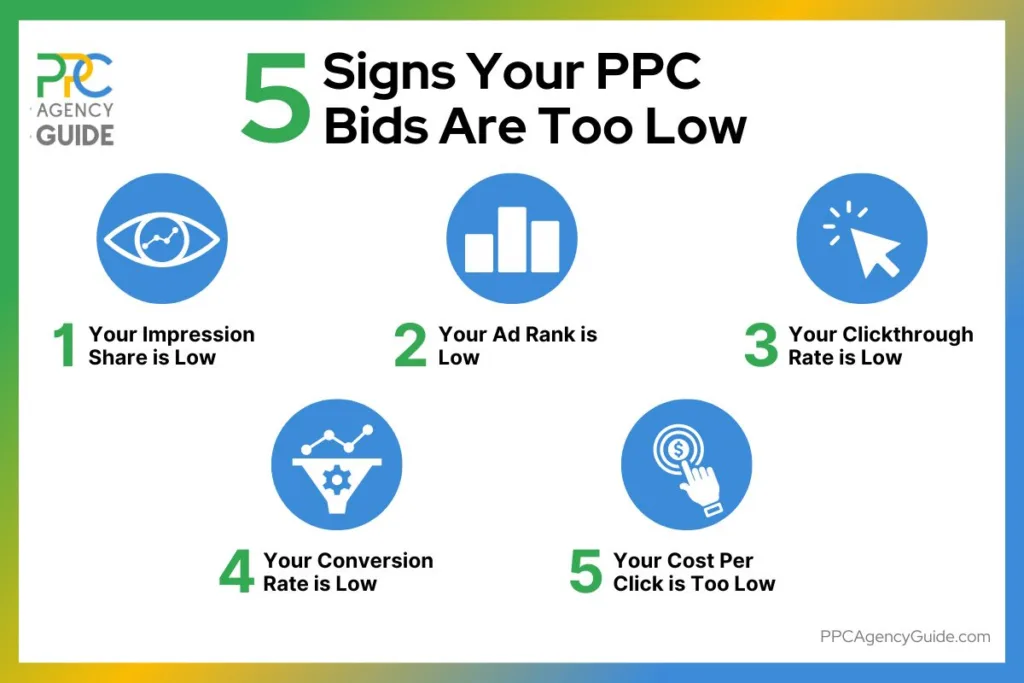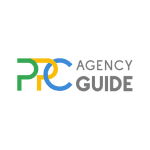
On the surface, winning a PPC auction with a low bid may seem like a good thing. After all, who doesn’t like spending less? However, low bids can actually undermine your PPC efforts and harm your results. On this page, we’ll walk you through why low bids are a problem, how to tell if you’re underbidding, and cover bidding strategies that can help.
Why Low PPC Bids Are a Problem
PPC ad platforms like Google Ads and Microsoft Advertising host an auction each time an ad is displayed to a user. These aren’t like traditional auctions in which the highest bidder wins the item. Instead, they try to strike a balance between providing the user (your potential customer) with a good experience and bringing in ad revenue. The top bidder doesn’t always win because of this, but your bid amount is a significant factor.
Additionally, ad platforms usually have multiple ad spots up for grabs in each auction. Your bid plays a role in the spot your ad gets, which significantly influences whether people see it and react to it.
You can still “win” an auction with a low bid, but the amount of traffic your website receives and the quality of that traffic will be less. You don’t need sky-high bids to win, though you do need to deliver a good experience with your ads and set bids competitively for your campaigns to perform well.
Signs Your PPC Bids Are Too Low

You’ll likely observe one or more of the following symptoms if your bid is too low.
1. Your Impression Share is Low
Each time your ad is visible on a page, it’s called an “impression.” Impression share (IS) refers to how many impressions your ads receive compared to how many they could receive. Most ad platforms will provide you with this metric. Ideally, your impression share should be around 80 percent for your most important keywords, though 90 to 95 percent is a better target if your keywords have low competition.
2. Your Ad Rank is Low
Ad rank is a value assigned by the advertising platform that determines how high up on a page an ad will display in relation to other ads or if it will display at all. For instance, if one advertiser has an ad rank of 80 and the other has an ad rank of 50, the one with 80 will display on the page first.
Factors that impact ad rank, per Google, include:
- Your bid
- Quality of ads and landing page
- Ad rank thresholds
- Competitiveness at auction
- Context of the person’s search
- Expected impact from your ad assets and other ad formats
Keep an eye on your top and absolute top impression percentages. Top impression, displayed as “Impr. (Top)%,” refers to the percentage of your ad impressions shown anywhere above organic search results when you’re running search ads. Absolute top displayed as “Impr. (Abs. Top)%” refers to how often your ad appears above organic results in the first spot.
3. Your Clickthrough Rate is Low
Clickthrough rate (CTR) is the percentage of clicks your ads receive in relation to impressions. Because people are less likely to click ads that appear lower on the page, a low CTR can also be a symptom of low PPC bids.
4. Your Conversion Rate is Low or Dropping
Your conversion rate (CVR) is the percentage of people who take action after clicking your ad. While many potential causes exist for a low CVR, low-quality traffic is a common issue. You will wind up with more low-quality traffic if your bids are low.
5. Your Cost per Click is Too Low
Cost per click (CPC) refers to how much your business pays each time someone clicks on your ad. Check industry benchmarks to see what other businesses like yours pay for each click. While having a lower CPC if you have a good ad quality score is possible, a significantly lower CPC likely means your bids aren’t competitive.
How to Fix Low PPC Bids
There are many different strategies to combat low PPC bids. We’ll review a few of the most popular methods below.
Evaluate Your PPC Budget

Many businesses intentionally set their bids low because they have a low budget. If your budget is holding you back, conduct an audit to see how much you should spend on PPC. Starting with your goals and working backward makes it easier to see how much you should spend overall.
Work with Bid Adjustments
To optimize your bids for better performance, utilize bid adjustments to test different bid levels for specific factors like device, time of day, and location.
Automate Your Bids
Consider switching to automated bidding strategies like target cost per action (CPA) or target return on ad spend (ROAS) to let the algorithm optimize bids based on your desired goals.
Target CPA Bidding
Target CPA bidding automates the bidding process, unlocking maximum conversions at your desired cost per action. Simply set your target cost, and the algorithm works its magic, bringing in customers while staying within your budget.
Target ROAS Bidding
Target ROAS harnesses Google’s AI to predict the conversion value of every search, allowing your bids to adapt and maximize your return on ad spend dynamically.
Get Help Improving Your PPC Bidding Strategy
Low PPC bids are only one reason campaigns may underperform. An experienced PPC agency can review all aspects of your campaigns to identify and troubleshoot issues to ensure you get the ROAS you deserve. To be connected with a PPC agency that understands your industry, request a complimentary consultation.


















